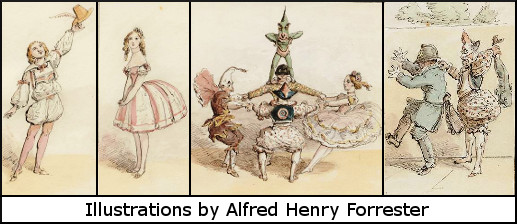H. Croccoquill? Alfred Crowquill? Alfred Henry Forrester?

Question for Quote Investigator: I recently encountered an insightful quotation that begins:
Don’t allow idleness to deceive you. . .
Someone with the unusual name “H. Croccoquill” was credited, but I have been unable to learn anything about him or her. Is this ascription accurate?
Reply from Quote Investigator: No. The earliest instance located by QI appeared in an 1856 book for children written and illustrated by Alfred Crowquill. That name was a pseudonym shared by two brothers: Alfred Henry Forrester and Charles Robert Forrester. However, Charles died in 1850, and the 1856 book was crafted by Alfred alone.1
The quotation occurred in a story titled “The Dwarf and the Woodcutter” which included a scene of a child observing a dozen ants moving a single grain of corn to an underground storehouse. The child addressed the ants and suggested that they should save their labor and simple eat the grain. The leading ant replied with a lecture on industriousness. Emphasis added by QI:2
Did we seek only to devour on the spot, all we found, we should be gluttons, and get lazy, and, surprised by the winter, die in our homes, for the want of that which we ought to have gathered by our industry in the proper season. Ah, my little man, do not allow Idleness to deceive you, for while you give him to-day he steals to-morrow from you.
Below are additional selected citations in chronological order.
In 1871 the statement was remembered and used as a filler item in a Nashville, Tennessee newspaper:3
Do not allow idleness to deceive you, for while you give him to-day, he steals to-morrow from you.—Crowquill
The phrase above and its ascription were included in the 1927 edition of “The New Dictionary of Thoughts: A Cyclopedia of Quotations”.4 This long-lived series of references was originally edited by Tryon Edwards.
In 1989 “New York Times” columnist and language maven William Safire co-edited “Words of Wisdom: More Good Advice” with his brother. The Crowquill saying was included, but the initial of the first name was specified as “H” instead of “A”:5
Do not allow idleness to deceive you; for while you give him to-day, he steals tomorrow from you.
—H. Crowquill
In 2014 the “Inc.com” website posted “18 Quotes to Boost Your Productivity Right Now”. The following two items were included:6
12. “Don’t allow idleness to deceive you, for while you give him today, he steals tomorrow from you.” H. Croccoquill
13. “You need a plan to build a house. To build a life, it is even more important to have a plan or goal.” Zig Ziglar
The anomalous spelling “Croccoquill” might be a phonetic transcription of the name that received credit for the saying during a speech.
In conclusion, the quotation under examination should be ascribed to Alfred Henry Forrester who used the pseudonym Alfred Crowquill in 1856. The name Croccoquill was an error.
Image Notes: Illustrations from “Pantomime As It Was Is and Will Be”, Original Drawings by Alfred Crowquill held at the Houghton Library of Harvard University. Images have been cropped, resized, and retouched.
Acknowledgement: Great thanks to Tom Schroeder whose inquiry led QI to formulate this question and perform this exploration.
Update History: On April 18, 2025 the format of the bibliographical notes was updated.
- 1989 Copyright, The Stanford Companion to Victorian Fiction by John Sutherland, Entry: Alfred Crowquill, Quote Page 164, Stanford University Press, Stanford, California. (Google Books Preview) ↩︎
- 1856, Tales of Magic and Meaning, Written and Illustrated by Alfred Crowquill (Alfred Henry Forrester), Story: The Dwarf and the Woodcutter, Start Page 88, Quote Page 104, Grant and Griffith, London. (Google Books Full View) ↩︎
- 1871 September 24, Nashville Union and American, (Untitled filler item), Quote Page 1, Column 5, Nashville, Tennessee. (Newspapers_com) ↩︎
- 1927, The New Dictionary of Thoughts: A Cyclopedia of Quotations, Originally compiled by Tryon Edwards, Revised and Enlarged, Topic: Idleness, Quote Page 273, Column 2, Britkin Publishing Company, Charlotte, North Carolina. (Google Books Full View) ↩︎
- 1989, Words of Wisdom: More Good Advice, Compiled and edited by William Safire and Leonard Safir, Section: Idleness, Quote Page 186, Simon and Schuster, New York. (Verified on paper) ↩︎
- Website: Inc.com, Article title: 18 Quotes to Boost Your Productivity Right Now, Article author: John Brandon (Contributing editor), Date on website: September 26, 2014, Website description: Inc.BrandView – Thought leadership for business owners, (Accessed inc.com on January 24, 2017) link ↩︎